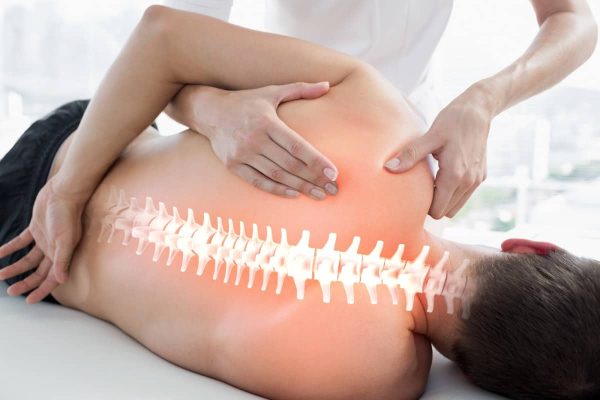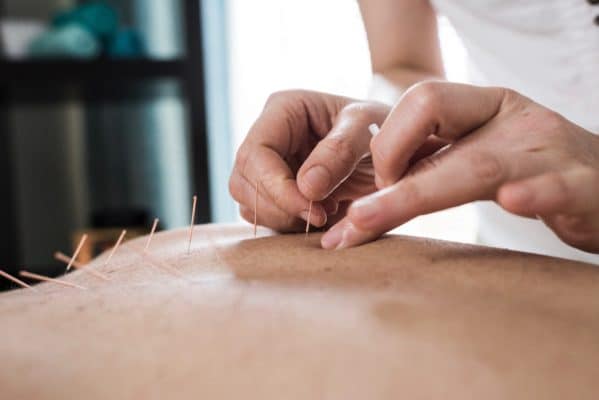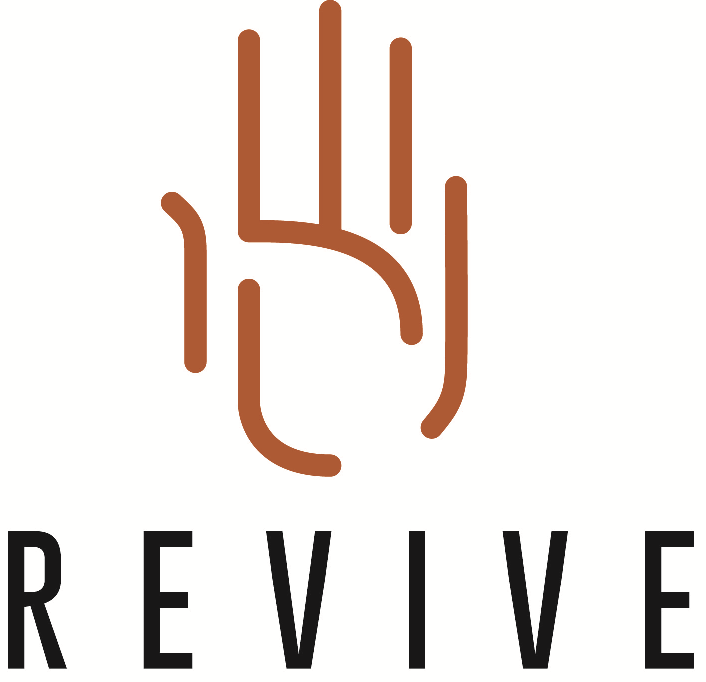BACK PAIN PHYSIOTHERAPY IN PERTH
Expert Treatment & Lasting Relief
 Lower back pain is an extremely common condition with up to 80% of the population experiencing back pain at some time during the lives.
Lower back pain is an extremely common condition with up to 80% of the population experiencing back pain at some time during the lives.
Although the underlying pathology of low back pain is usually not serious, it is an important cause of pain in the community and has considerable impact on the economy due to time taken off work.
While most back pain resolves within six weeks, a small percentage can develop chronic back pain and a gradual decline in functionality. Early intervention is crucial to preventing this, and our experienced physiotherapists are here to help you regain your active lifestyle.
At Revive Physiotherapy in Perth, we understand the widespread impact of back pain and are dedicated to providing expert care that addresses the root cause of your discomfort, offering long-term relief rather than just a quick fix.
Book a Session with a Back Pain Physio
Our experienced Physiotherapists can assess and treat your back pain.
Book in at one of our Perth physio clinics today for an initial consultation or call now (08) 9300 0841.
Understanding Lower Back Pain – common symptoms
Pain associated with your back can be characterised by different types of pain, including sharp, stabbing pain, aching pain, and burning pain. You might experience pain in your lower, mid, or upper back, and it can worsen with movement, prolonged sitting, or even standing.
Stiffness and reduced flexibility in your spine are also common, and sometimes, the pain can radiate to your hips, buttocks, or legs – a condition known as sciatica. Muscle spasms and tightness in the back can further contribute to your discomfort.
Acute lower back pain is typically caused by a sudden injury or trauma, such as a muscle strain or ligament sprain. Chronic lower back pain, on the other hand, is often caused by a combination of factors, including poor posture, muscle imbalances, and degenerative changes.
Causes of Lower Back Pain
 Most causes of back pain are the result of irritation or poor function of the bones, joints, ligaments or muscles in your back.
Most causes of back pain are the result of irritation or poor function of the bones, joints, ligaments or muscles in your back.
Such irritation can be the result of Vertebral dysfunction, a common condition that occurs when the spinal vertebrae compress or irritate the delicate nerve structures of your lower back.
Other causes include inflammatory arthritis (e.g., ankylosing spondylitis, rheumatoid arthritis), fractures due to osteoporosis, and referred pain from other areas of the body. Less common causes include cancer (often originating elsewhere, like the prostate or lung), serious infections, and spinal cord compression.
Specifically, lower back pain can be attributed to several factors. Poor posture and prolonged sitting are major contributors. Muscle strains and ligament sprains from everyday activities or sports are also common. Herniated or bulging discs, sciatica and other nerve compression issues, arthritis, degenerative disc disease, scoliosis, spinal alignment problems, sports injuries, and heavy lifting strains can all contribute to back pain.
Assessment of Lower Back Pain
Your Physiotherapist will perform a detailed history, orthopaedic, neurological and spinal examination to determine the exact cause of your lower back pain.
Other tests including x-rays and digital scanning may also be recommended.
Types of Back Pain & Related Conditions
At Revive Physiotherapy we treat various types of back pain and related conditions, including:
- Lower back pain (lumbago): Pain in the lower back, often caused by muscle strain or vertebral dysfunction.
- Mid and upper back pain: Pain in the middle or upper back, often caused by muscle strain or poor posture.
- Sciatica: Pain that radiates from the lower back down to the legs, often caused by compression of the sciatic nerve.
- Disc injuries: Herniated, bulging, or degenerative discs can cause back pain and sciatica.
- Facet joint pain: Pain in the facet joints, which connect the vertebrae in the spine.
- Postural imbalances: Poor posture can lead to muscle imbalances and back pain.
- Work-related back pain: Back pain caused by work-related activities, such as heavy lifting or bending.
- Osteoarthritis: Wear and tear on the joints can cause back pain and stiffness.
- Age-related back conditions: Conditions such as spinal stenosis and degenerative disc disease can cause back pain in older adults.
Treatment of Lower Back Pain with Physiotherapy
Physiotherapy treatment of lower back pain focuses on restoring function to poorly moving spinal joints, reducing muscle tension, and increasing muscle strength. This leads to improved movement, reduced pain, and decreased nerve irritation.
Treatments are tailored to the individual case usually consisting of spinal and soft tissue mobilisation, core stabilisation advice, strengthening exercises, stretching and heat/cold therapy.
We use hands-on treatment techniques to provide immediate pain relief, and we’ll guide you through corrective exercises to strengthen your back and core, promoting long-term stability. Postural training and ergonomic advice will help you improve your daily habits and prevent pain recurrence.

Our physiotherapists use evidence-based treatments to provide effective relief from back pain. These include:
- Manual therapy and soft tissue release
- Postural correction and ergonomic training
- Targeted strengthening and rehabilitation exercises
- Dry needling and myofascial release
- Spinal mobilisation and joint manipulation
- Pain education and lifestyle modifications
Preventing Back Pain Recurrence
To prevent recurrence, we recommend maintaining a healthy lifestyle that includes regular exercise, proper ergonomics, and safe lifting techniques. Regular exercise, such as daily mobility and stretching exercises, can help maintain flexibility and strength. It’s also important to strengthen the core and supporting muscles, which can be achieved through targeted exercises.
In addition to exercise, making workplace ergonomic adjustments and learning proper lifting techniques can also help reduce strain on your back. Finally, maintaining a regular exercise routine that doesn’t put excessive strain on your back can help prevent recurrence.
By following these tips, you can reduce your risk of back pain recurrence and maintain a healthy, active lifestyle.
Contact Revive Physiotherapy
Are you dealing with back pain? We can help.
Our experienced team of physiotherapists and exercise physiologists will provide you with a thorough assessment and treatment plan using a range of techniques that are designed to decrease your pain, improve mobility and your quality of life.
We offer expert care from experienced physios, utilising the latest research, techniques, and technology to provide personalised treatment plans. Our clinics feature state-of-the-art facilities, convenient clinic locations around Perth, and flexible appointment times to ensure your needs are met.
Book an Appointment Today
Don’t let back pain hold you back any longer. Book an appointment with our experienced physiotherapists today and take the first step towards a pain-free life.
Contact us on (08) 9300 0841 or book online.
Frequently Asked Questions
We understand that you may have questions about back pain and physiotherapy treatment. Here are some answers to frequently asked questions:
If you’re experiencing persistent or severe back pain that’s affecting your daily activities, sleep, or overall quality of life, it’s a good idea to consult with a physiotherapist. We can help you identify the underlying cause of your pain and develop a treatment plan to address it.
While physiotherapy can’t guarantee a permanent fix, our experienced physiotherapists can help you reduce pain, improve function, and enhance your overall quality of life.
The best treatment for lower back pain often involves a combination of manual therapy, exercise, and education on self-management strategies. Our physiotherapists will work with you to develop a treatment plan that’s tailored to your individual needs and goals.
In most cases, you don’t need scans before seeing a physiotherapist. However, if we suspect a more serious underlying condition, such as a fracture or tumor, we may refer you for scans or further medical investigation.
Poor posture can contribute to back pain, but it’s often just one part of the puzzle. Other factors, such as muscle imbalances, degenerative changes, and underlying medical conditions, can also play a role in the development of back pain.
Exercise can exacerbate back pain if it’s not done correctly or if it puts too much strain on the back. However, exercise can also be a powerful tool for reducing back pain and improving function. Our physiotherapists will work with you to develop an exercise program that’s tailored to your individual needs and goals.
The number of physiotherapy sessions you’ll need depends on the severity of your back pain and the complexity of your condition.
Both physiotherapists and chiropractors can provide effective treatment for back pain. However, physiotherapists tend to focus more on exercise, manual therapy, and education on self-management strategies, while chiropractors tend to focus more on spinal manipulation and adjustments. If you’re unsure which option is best for you, we recommend consulting with a physiotherapist or chiropractor to discuss your individual needs and goals.

